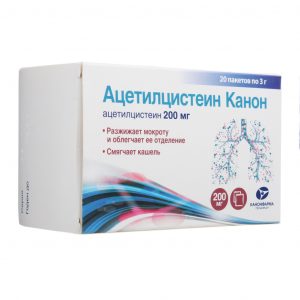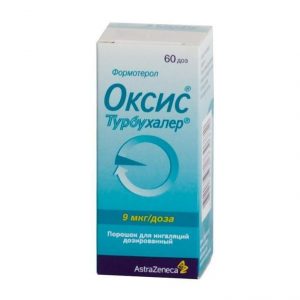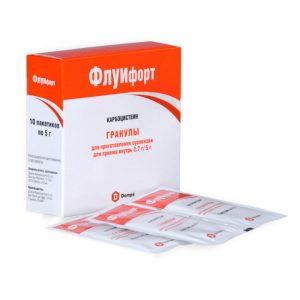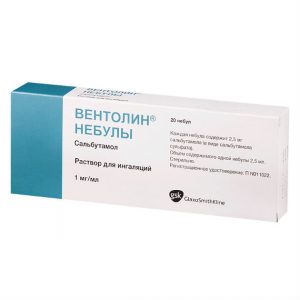Description
Release form
Aerosol.
Packing
10 ml – 200 doses.
Pharmacological Action
Ipratropium bromide is a quaternary ammonium compound. It has anticholinergic properties. It inhibits the vagus nerve reflexes, being a competitive antagonist of the neurotransmitter acetylcholine. It blocks the muscarinic receptors of the smooth muscles of the tracheobronchial tree and suppresses reflex bronchoconstriction. The expansion of the bronchi with inhalation is mainly due to the local, rather than systemic, anticholinergic effect of the drug. Effectively prevents narrowing of the bronchi resulting from inhalation of cigarette smoke, cold air, the action of various bronchospasm agents, and also inhibits bronchospasm associated with the influence of the vagus nerves. When inhaled, it practically does not have a resorptive effect – for the development of tachycardia, inhalation of about 500 doses is necessary, while only 10% reaches the small bronchi and alveoli, and the rest settles in the throat or oral cavity and is swallowed.
In patients with bronchospasm, associated with chronic obstructive pulmonary disease (chronic bronchitis and pulmonary emphysema), a significant improvement in lung function (increase in forced expiratory volume in 1 s – FEV1 and average volumetric expiratory flow rate of 25-75% increased by 15% or more) is observed after 15 minutes, the maximum effect is achieved after 1 2 hours and lasts in most patients up to 6 hours.
In patients with bronchospasm associated with bronchial asthma, a significant improvement in lung function (an increase in FEV1 by 15% or more) is observed in 40% of patients.
Indications
Chronic obstructive pulmonary disease (chronic obstructive bronchitis, pulmonary emphysema).
Bronchial asthma (moderate and mild), especially with concomitant diseases of the cardiovascular system.
Contraindications
Hypersensitivity to atropine and its derivatives, and other components of the drug.
Pregnancy (I trimester).
Children under 6 years old.
Use during pregnancy and lactation
Contraindicated in the I trimester of pregnancy, the drug is possible in the II-III trimester of pregnancy and during breastfeeding only if the expected effect of therapy exceeds the potential risk to the fetus or baby.
Special instructions
Not recommended for emergency relief of an asthma attack (bronchodilator effect develops later, than beta adrenostimulants).
Patients with cystic fibrosis have an increased likelihood of developing a decrease in gastrointestinal motility.
Patients should be able to correctly use Atrovent H Dosage Inhalation Aerosol.
When using the freon-free dosage form of the aerosol for the first time, patients may note that the new drug tastes slightly different from the previous dosage form of the drug containing freon. When switching from one form of the drug to another, patients should be warned about a possible change in the taste properties of the drug. It should be reported that these drugs are interchangeable, and that the taste is not related to the safety and effectiveness of the new drug.
0.025% solution for inhalation contains a preservative benzalkonium chloride and a stabilizer of ethylenediaminetetraacetic acid. There are reports that these substances, when prescribed in large doses, can cause bronchospasm in some patients.
It is not recommended to exceed the established daily dose, both with short-term and long-term use of the drug.
Caution should be used in patients with angle-closure glaucoma and urination disorders due to benign prostatic hyperplasia.
In case of accidental contact with the drug in the eyes of a patient with angle-closure glaucoma, an increase in intraocular pressure is possible.
Eye pain or discomfort, blurred vision, the appearance of a halo and colored spots in front of the eyes combined with conjunctival and corneal hyperemia can be symptoms of an attack of narrow-angle glaucoma. In case of any of these symptoms, drops should be prescribed. causing constriction of the pupil and immediately contact an ophthalmologist.
If the patient worsens or there is no significant improvement, a doctor ² ¢s consultation is necessary to determine a plan for further treatment. In case of sudden and rapid intensification of shortness of breath (difficulty breathing), you should immediately consult a doctor.
For children, Atrovent H dosage aerosol should be prescribed only after a doctor’s recommendation and under the supervision of adults.
Composition
1 dose contains:
Active ingredient: ipratropium bromide – 0.021 mg, (which corresponds to 0.02 mg of ipratropium bromide anhydrous).
Propellant: 1,1,1,2-tetrafluoroethane (HFA 134a).
Excipients: citric acid anhydrous water distilled ethanol
Dosage and Administration
Inhalation.
Dosage inhalation aerosol: for adults and children over 6 years – 2 doses of aerosol 4 times a day, if necessary, the dose can be increased to 12 inhalations per day.
Side effects of
The most common unwanted effects are headache, nausea, and dry mouth.
Due to the low systemic absorption of the drug, side effects associated with systemic anticholinergic effects, such as tachycardia, palpitations, accommodation disorders, decreased secretion of sweat glands, impaired gastrointestinal motility, urinary retention, are rare and are reversible. However, patients with obstructive urinary tract infections are at increased risk for urinary retention.
As with other inhalation therapy, incl. bronchodilators, cough is sometimes observed, less often – paradoxical bronchospasm.
In rare cases, the development of allergic reactions is possible, including urticaria, angioedema, rash, oropharyngeal edema and anaphylaxis.
There are some reports of eye complications (dilated pupil, increased intraocular pressure, angle-closure glaucoma, pain in the eye) when ipratropium bromide or in combination with beta2-agonist aerosol ipratropium bromide gets into the eyes. Patients should be able to use the metered-dose aerosol correctly.
Drug Interactions
Potentiates the bronchodilator effect of beta-adrenergic agonists and xanthine derivatives. Enhances the cholinolytic effect of other drugs.
Overdose
Symptoms: no specific symptoms of overdose were detected. Minor manifestations of systemic anticholinergic action, such as dry mouth, impaired accommodation, increased heart rate, are possible.
Treatment: symptomatic.
Storage Conditions
In a dark place at a temperature not exceeding 25 ° C.
Keep out of the reach and sight of children.
active substance
Ipratropium bromide
Terms leave through pharmacies
In retseptu
lekarstvennaja form
aerosols for ynhalyatsyy
Prescription
For adults as prescribed by a doctor, Children as prescribed by a doctor
Beringer Ingelheim, Austria




